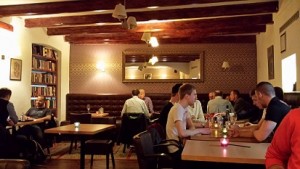
Rainbow Families on Holiday
September 25, 2014
by Carla Barrett
 Are you a gay or lesbian parent who has ever been on holiday with your children? If so, you may be interested in taking part in a University of Brighton study.
Are you a gay or lesbian parent who has ever been on holiday with your children? If so, you may be interested in taking part in a University of Brighton study.
University research indicates that we travel more often than our straight counterparts, yet most studies on Family Tourism focus on families formed of straight parents whilst failing to address gay and lesbian families. Rodrigo Lucena is a PhD researcher who is conducting a study of what motivates gay and lesbian families when they choose where to spend their holidays and how their decision-making processes take place. If you fall into this category, Rodrigo would love to hear from you.
If you are a gay or lesbian family and have already travelled with your children (regardless of their age), please contact Rodrigo via email on rldm10@brighton.ac.uk so he can meet you for a short and informal conversation. Time and place will be set according to your convenience and all information will be treated confidentially.
Call for Papers on Soviet and Post-Soviet Sexualities (UCL)
July 18, 2014
by Carla Barrett
Call for papers for a one-day workshop on
Soviet and Post-Soviet Sexualities
UCL School of Slavonic and East European Studies
Friday, 20 February 2015
The aim of this one-day workshop is to engage critically with the under-researched topic of Soviet and post-Soviet sexualities. Prompted by the introduction of laws restricting the rights of LGBTQ citizens and the increase in homophobic violence in Russia and other post-Soviet states, there is a pressing need to understand attitudes towards non-normative sexualities, the lived experience of sexual minorities and the ways in which LGBTQ individuals and groups seek/have sought to negotiate/resist heteronormative structures and homophobia in the specific socio-political, cultural and historic contexts of the Soviet and post-Soviet space. The workshop will comprise papers from and debate among both established academics and research students from a range of disciplines and working on various aspects of the study of non-normative sexualities in the Soviet and post-Soviet space. The aim is to publish a special issue and/or an edited volume of the papers presented.
Confirmed speakers:
- Philip Bullock, University of Oxford
- Dan Healey, University of Oxford
- Alexander Kondakov, European University of St Petersburg
- Richard Mole, University College London
- Francesca Stella, University of Glasgow
If you would like to participate, please send an abstract of 200-300 words to Richard Mole at UCL (r.mole@ucl.ac.uk) by 1 September 2014. Papers from researchers based in the former Soviet Union will be particularly welcome. Funds are available to make a contribution (up to 100%) towards presenters’ travel and accommodation costs.
Blogging for LGBTQ Families Day
May 27, 2014
by Carla Barrett
Monday 2nd June is the ninth annual Blogging for LGBTQ Families Day.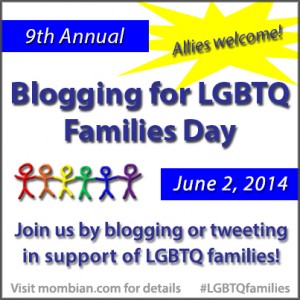
The day was first launched on the lesbian parenting website mombian.com as a means of showing support for and raising awareness of LGBTQ families. The day is sure to provide a fascinating opportunity to learn more about the everyday lives and experiences of LGBTQ families.
If you own a blog, are interested in blogging, or need an excuse to start, why not submit a post? More details of how to take part are available from the Mombian website by clicking here.
If you are more interested in reading other people’s stories rather than writing one yourself, be sure to check out the Mombian website or Twitter hashtag #LGBTQfamilies on 2nd June.
Join the IDAHOT Rainbow
May 10, 2014
by Carla Barrett
 Get involved and make a stand against homophobia, biphobia and transphobia!
Get involved and make a stand against homophobia, biphobia and transphobia!
SUSU Equality and Diversity Committee are creating the LGBT rainbow out of handprints throughout Friday the 16th of May, for the International Day Against Homophobia and Transphobia (IDAHOT).
Go to the SUSU building on Highfield Campus to add your handprint and show your support for lesbian, gay, bisexual and trans* people around the world.
Letter from a LGBT Czech Republic – Professor Mark Cornwall
April 19, 2014
by Carla Barrett
Professor Mark Cornwall explores LGBT life in the Czech Republic.
I lived in Prague for six months in 1989 in the dying days of the hardline Czech Communist regime (when Vietnam and Romania were the regime’s only real allies!). One had to search very hard for any LGBT venues or open gay culture of any kind. This, despite the fact that male and female homosexuality had been legalized in Czechoslovakia in 1961. Perhaps the most famous gay club was the T-Club near Wenceslas square. It was hard to find and pretty unwelcoming. You went down some steep steps and up against an iron gate which had to be unlocked and then locked again by a grumpy doorman. Inside was a small dance floor and bar where a preferred drink seemed to be red wine and coke; western music blared out. It was always said that the club was watched by the secret police, and certainly it was a state-run enterprise. If you want to get a feel of the place now, there is quite an accurate description in the new novel, Necessary Errors, by the American writer Caleb Crain (although readers may wince a bit at the naïve American abroad in Europe). Elsewhere in Communist Prague, one needed a special gaydar to find any LGBT culture: it only took off publicly after the Velvet Revolution.
And now? Well, a quarter of century later, Prague is flourishing and feeling quite at ease with its gay culture. There are a whole range of venues including, apart from the standard pubs and clubs, a very relaxing ‘cultural centre’ called the Q Café near the National Theatre. There you can even find a gay library. For the history of Czech homosexuality is only just being written: three books came out in the last two years, exploring LGBT culture, literature and history. Perhaps there is too much focus on men, too little on women, but things are certainly changing and veering away from gender stereotypes. It is a far cry from the rent boys and secret bars of 1989. Now too, it is possible to go on a tour of gay historic Prague with a leading queer historian, so a ‘gay historic space’ is being reclaimed and made part of a broader public memory. And if Czech gays and lesbians do not have gay marriage, they do have civil partnerships and gay adoption rights. For a culture which has often sometimes seemed a bit too hetero (see the novels of Milan Kundera), one can say that Queer Prague is slowly emerging. Make sure you visit it.
LGBT Geography at the AAG Annual Meeting
March 31, 2014
by Carla Barrett
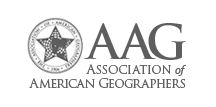 Every year, the AAG (Association of American Geographers) hosts an Annual Meeting to showcase the latest research in Geography, sustainability and GIS. This year the Annual Meeting is taking place in Tampa, Florida, from 8th to 12th April.
Every year, the AAG (Association of American Geographers) hosts an Annual Meeting to showcase the latest research in Geography, sustainability and GIS. This year the Annual Meeting is taking place in Tampa, Florida, from 8th to 12th April.
A number of sessions focus on LGBT people and spaces, including Trans* Geographies, Queer of Colour Geographies, and Challenging Hetero/Homonormativities in Homespaces.
In addition, Dr Lynda Johnston (University of Waikato) will give a paper on intersex bodies and geographies of prejudice; Dr Eleanor Wilkinson (University of Leeds) will present her research on queer temporalities and the politics of non-reproduction; and Dr Nathaniel Lewis (University of Nottingham) will give a paper on migration and wellbeing in the gay life course.
I will be tweeting from the conference so follow @SotonLGBT and @CarlaGeog on Twitter for updates.
Homomonument Amsterdam
March 17, 2014
by Carla Barrett
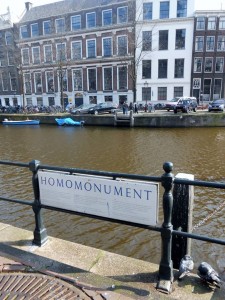 As part of the BA Geography programme at the University of Southampton, second year students spend 5 days completing fieldwork and developing their research methods in either Amsterdam or Paris. I recently returned from teaching on this year’s fieldtrip in Amsterdam.
As part of the BA Geography programme at the University of Southampton, second year students spend 5 days completing fieldwork and developing their research methods in either Amsterdam or Paris. I recently returned from teaching on this year’s fieldtrip in Amsterdam.
One of the key themes of the fieldtrip is memorialisation and we encourage the students to visit a number of sites including Anne Frank House in order to research the processes of memorialisation and place-making. One of the memorials that I personally visited was the Homomonument. The monument, which was first unveiled in September 1987, is located a short walk from Anne Frank House on the Westermarkt. The monument was constructed with the intention of not only commemorating the homosexuals who were persecuted during World War II, but to commemorate all LGBT people who face or have faced discrimination and oppression.
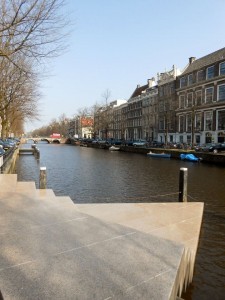 Designed by Karin Daan, the monument is composed of three smaller triangles contained within a larger triangle. As such, the design draws on or reappropriates the pink triangle sign used to identify homosexuals during World War II. One of the smaller triangles of the monument extends into the canal, and I feel that this is the focal point. It stands out, helping to shape the canal just as the LGBT people it commemorates help to shape the city of Amsterdam and world beyond.
Designed by Karin Daan, the monument is composed of three smaller triangles contained within a larger triangle. As such, the design draws on or reappropriates the pink triangle sign used to identify homosexuals during World War II. One of the smaller triangles of the monument extends into the canal, and I feel that this is the focal point. It stands out, helping to shape the canal just as the LGBT people it commemorates help to shape the city of Amsterdam and world beyond.
More information is available here.
Sexuality, Asylum, Evidence and Existence
March 4, 2014
by Carla Barrett
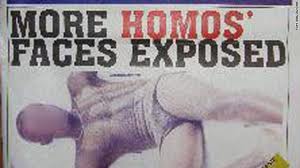 Claire Bennett (ESRC Centre for Population Change) is giving a talk entitled ‘Sexuality, Asylum, Evidence and Existence’ at the Weeks Centre for Social and Policy Research on Tuesday 11th March at 2pm. This is part of the Families and Social Capital Research Group Seminar Series at LSBU. Claire’s seminar will draw upon her PhD research on lesbian asylum seekers.
Claire Bennett (ESRC Centre for Population Change) is giving a talk entitled ‘Sexuality, Asylum, Evidence and Existence’ at the Weeks Centre for Social and Policy Research on Tuesday 11th March at 2pm. This is part of the Families and Social Capital Research Group Seminar Series at LSBU. Claire’s seminar will draw upon her PhD research on lesbian asylum seekers.
The seminar is free and open to all. To RSVP please email gilliev@lsbu.ac.uk, or for more information click here to download a flyer.
The Unfinished Battle for LGBT Human Rights in the UK
March 3, 2014
by Carla Barrett
In 1999, Britain had the largest number of anti-gay laws of any country in the world. Indeed, the criminalisation of homosexuality only finally ended in 2003. In just over a decade, we have made huge advances towards LGBT equality.
Peter Tatchell, human rights campaigner and Director of the Peter Tatchell Foundation, will be giving the 4th annual Human Rights Lecture at the University of Southampton on 1st May 2014.
This event is hosted by Humanities, Business & Law and Amnesty International. For more information, including how to register for this event, please click here or contact Tracy Storey at tps@southampton.ac.uk.
Seeking Asylum in the UK: Lesbian Perspectives
February 24, 2014
by Carla Barrett
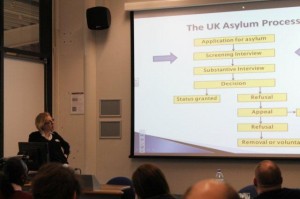 Claire Bennett is a member of the ESRC Centre for Population Change. She recently submitted her PhD, a qualitative study exploring how lesbian asylum seekers navigate the UK asylum process and the impact this has on their social and sexual identity. Her research covers the public and private nexus which are enacted during the asylum process and includes the legal requirement to ‘evidence your sexuality,’ to disclose personal and intimate accounts of same-sex relationships and to frequently recall experiences of sexual violence to the Home Office and immigration judges.
Claire Bennett is a member of the ESRC Centre for Population Change. She recently submitted her PhD, a qualitative study exploring how lesbian asylum seekers navigate the UK asylum process and the impact this has on their social and sexual identity. Her research covers the public and private nexus which are enacted during the asylum process and includes the legal requirement to ‘evidence your sexuality,’ to disclose personal and intimate accounts of same-sex relationships and to frequently recall experiences of sexual violence to the Home Office and immigration judges.
To read more about her current research project, click here.
Her research was also referred to in a recent Guardian article, entitled ‘Home Office wouldn’t believe I was gay: how do you prove it?’ To read the article, click here.

